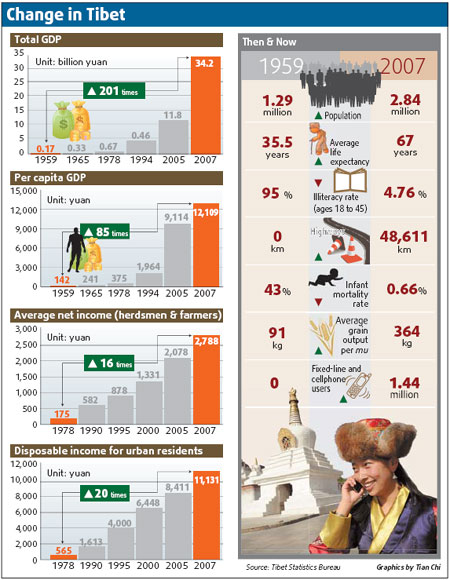
|
CHINA> Regional
 |
|
Release from a cycle of servitude
By Hu Yinan (China Daily)
Updated: 2009-01-22 07:44 Then in 1954, Yeshe learned of the 17-Article Agreement between the Central People's Government and the Local Government of Tibet that had been signed three years before.
"I heard it from a batch of People's Liberation Army (PLA) soldiers on my way back from a trip to Qamdo," he said. "It was the first time I heard about it because people had no access to radio and could not read any newspapers." "So I fled the monastery and became a servant of an aristocrat," Yeshe said. "Even slave labor for a lord felt better than working in Drepung." Three years later, he joined the revolution and was assigned to study the Tibetan language for the first time in the PLA's Tibetan Cadre School. After the Democratic Reform, Yeshe became one of Lhasa's first batch of 25 traffic police officers. Now 74, Yeshe has been a People's Congress delegate for the city's Chengguan district for five years. Kerong was assigned a house the size of about 60 sq m, (0.4 of a hectare) of farmland, a pregnant cow, a donkey and two bulls he shared with three other serf families during the Democratic Reform. "I had nothing before the Democratic Reform. But I was assigned such a large house later, with my own fields, cow and even seeds that were provided by the government. I was thrilled," he said. "That gratitude is shared by all." After years of servitude as a Tralpa, Kerong had time to learn how to grow crops. "And then the good years began," he said. Today, Kerong is living in a house 600 sq m in his native village in Lhasa's Todlung Dechen county. He will soon move into a fully renovated house close by, as part of a government-initiated settlement project for rural residents. "It has been a different world for me in the past 50 years," he said. "I spend most of my days boiling water and cooking for my kids. In my spare time, I pray and watch a little TV. I am very happy and I feel my life is fulfilled." Kerong's only regret is that his parents did not live to witness the end of the slavery. But he is thankful enough. "I occasionally think of the past when we have family reunions now. It wasn't possible to have a family reunion then." "I hope my kids know this," Kerong said. Some youngsters do know. Phubu Tsering is a guide for Xigaze's Pala Manor, a place infamous for the suffering serfs experienced under it. Phubu grew up in a local Nangzan family and his parents, now 69, were both former slaves of the Phakue Lhakhang family, whose core members included the 14th Dalai Lama's closest associates. "March 28, 1959, was the most important day in the lives of my parents," Phubu, 24, said. "It marked the start of their real lives because they were emancipated from that day on. If anything, March 28 is their new 'birthday'."

|